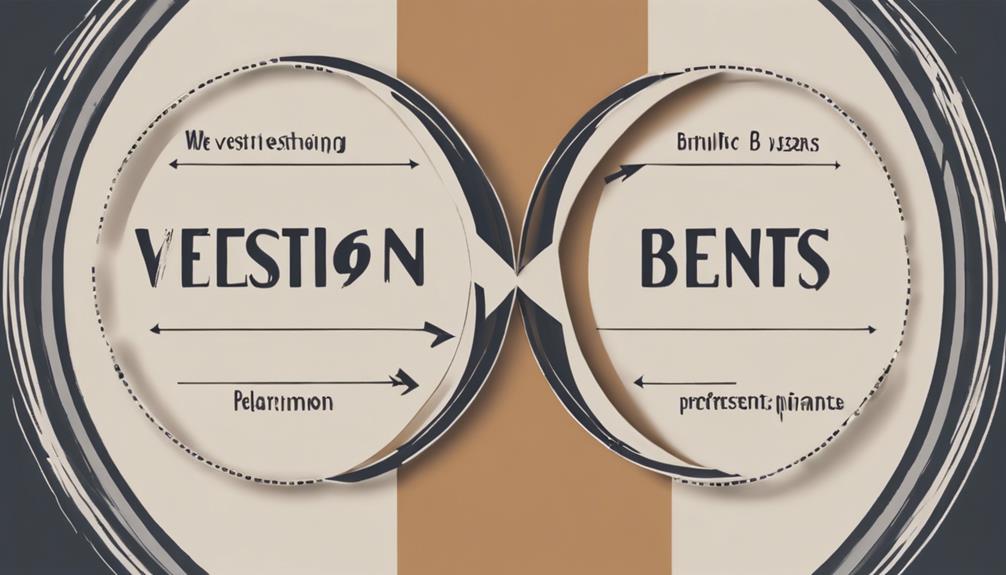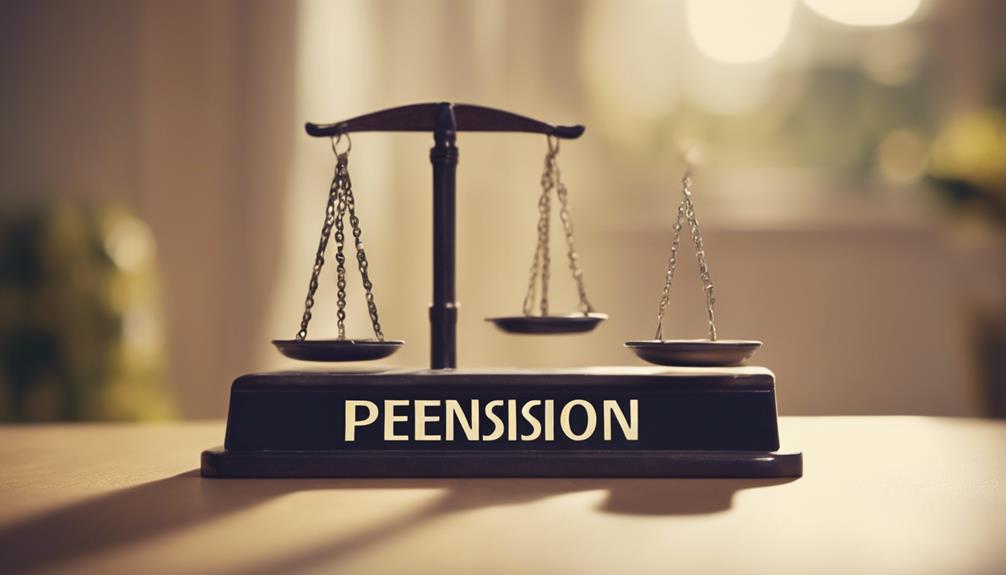When getting ready for retirement, your pension is a crucial factor in shaping your financial strategy. Different types of pensions such as defined benefit or cash-balance plans can impact the monthly amount you receive. Understanding vesting rules is essential for fully accessing your benefits. Contrasting pensions with 401(k)s allows you to see the advantages in income security versus investment control. It is important to adjust your retirement plans based on factors like pension amount, retirement age, and lifestyle. Long-term financial objectives should focus on maximizing contributions and diversifying savings for security. Recognizing the significance of integrating pensions, social security, and consultations with a financial advisor can improve retirement stability. More insights are available on how to maximize pension benefits and ensure financial well-being.
Key Takeaways
- Understanding pension benefits impacts retirement income strategies.
- Vesting determines when full rights to retirement income are gained.
- Choosing lump-sum or monthly payments affects retirement finances.
- Pension and 401(k) benefits differ in security and control.
- Adjust retirement plans based on pension for financial goals.
Types of Pension Plans
When preparing for retirement, understanding the various types of pension plans is essential for effective financial planning. Defined benefit plans offer retirees a fixed monthly payment based on salary and years of service, providing financial security. On the other hand, cash-balance pension plans define benefits with a cash balance that grows with annual credits and interest, offering a more flexible approach to retirement savings.
Public sector employees often have access to traditional defined benefit pension plans, ensuring a reliable income stream during retirement years. Some employers go a step further by offering both traditional pensions and defined contribution plans like 401(k)s, allowing employees to diversify their retirement savings and take more control over their financial future. Having a good grasp of the type of pension plan one has can have a significant impact on retirement planning strategies, helping individuals make informed decisions about their financial well-being post-retirement.
Vesting and Benefits

Understanding the vesting requirements and associated benefits is indispensable for managing a pension plan effectively. In defined benefit plans, vesting determines when employees gain full rights to their retirement income based on years of service. This guarantees that at retirement age, individuals can access guaranteed income streams from their pensions.
Unlike 401(k) plans, loans from pensions are generally prohibited to uphold the fund's long-term stability. When deciding between lump-sum payouts and monthly payments, it's important to take into account how these choices impact your retirement income. Opting for a lump-sum payout and investing it in an annuity can provide retirees with a reliable source of income over time.
Pension Vs. 401(K) Comparison
When comparing pensions to 401(k) plans, it's crucial to take into account the benefits each offers. Pensions provide a reliable lifetime income stream, while 401(k)s offer more investment control.
Understanding the differences in pension benefits, 401(k) investment options, and retirement income structures can help individuals make informed decisions about their retirement planning.
Pension Benefits Overview
Comparing pension benefits to 401(k) plans reveals the distinct advantages and differences in retirement planning options. Pensions, as defined benefit plans, offer a fixed regular payment for life, providing stable retirement income. In contrast, 401(k)s are defined contribution plans primarily funded by employees, allowing for more individual control over retirement funds.
While 401(k)s shift investment risks to individuals, pensions are employer-funded and managed, reducing individual risk. Traditional pensions guarantee steady income, offering less flexibility but more security. On the other hand, 401(k)s provide flexibility and control in retirement planning decisions.
Having both a pension and a 401(k) can diversify retirement income sources, striking a balance between guaranteed income and individual control over retirement funds.
401(K) Investment Options
While pension plans offer fixed, stable income streams, 401(k) plans provide individuals with more control over their investment options.
In a 401(k), there are various choices like mutual funds, stocks, bonds, and annuities to tailor investments based on risk tolerance and goals. Employees can contribute up to IRS limits, potentially benefiting from matching contributions from employers.
Unlike pensions, where the employer manages investments and assumes risks, 401(k) participants bear the investment risks themselves. Additionally, 401(k) plans offer portability and the opportunity for rollovers, allowing individuals to have flexibility in managing their retirement savings.
This control and range of investment options in 401(k) plans cater to those seeking more active involvement and potential growth in their retirement funds.
Retirement Income Comparison
Examining retirement income from pensions and 401(k) plans reveals distinct differences in income streams and control over investments. With defined benefit plans, pensions offer a guaranteed lifetime income based on service and salary.
In contrast, 401(k)s provide more control over retirement savings, allowing holders to manage their account investments. Pension fund contributions mainly come from employers, while 401(k) plans involve employee savings. Tax advantages vary between the two, impacting retirement income strategies.
Having both a pension and a 401(k) can create a diversified retirement income stream with different levels of risk and control. Understanding these variances is essential for effective retirement planning and ensuring financial stability in the future.
Impact of Pension Changes

When pension changes occur, it's crucial to understand how they can affect retirement planning. Factors like reduced benefits or frozen plans may impact our retirement income.
We must stay informed about pension reform effects, make necessary adjustments, and address any financial security concerns that arise.
Pension Reform Effects
Implementing pension reform measures can lead to significant changes in retirement benefits and financial security for employees. Employers may choose to reduce benefits, freeze plans, or merge existing ones, impacting retirement income.
Derisking strategies, such as transferring pension liabilities, can alter retirees' protections and financial decisions. In the process of stopping a retirement plan, specific procedures must be followed, potentially involving the Pension Benefit Guaranty Corporation (PBGC).
Freezing pension plans can halt benefit accrual, with different freeze types affecting future retirement benefits. These reforms highlight the importance of understanding how pension changes can influence individuals' retirement planning and financial well-being.
Retirement Income Adjustments
Understanding how modifications to pension plans impact retirement income is crucial for guaranteeing financial stability in retirement. When pension benefits change, it can greatly impact the amount of retirement income received, leading to the need for adjustments in financial planning.
To navigate these adjustments effectively, individuals should consider the following:
- Budgeting Impact: Reductions in pension payouts can result in lower overall retirement income, necessitating a reassessment of budgeting strategies to maintain financial stability.
- Investment Strategy Reevaluation: Changes in pension benefits may require a review of investment strategies to compensate for any decrease in retirement income from defined benefit plans.
- Retirement Timeline Adjustments: Individuals might need to reconsider their retirement timelines in response to modifications in pension benefits to ensure sufficient income during retirement years.
Financial Security Concerns
Changes in pension benefits directly impact the financial security of individuals planning for retirement. Alterations to pension plans, such as reductions or freezes in payouts, can have a substantial effect on the expected income during retirement.
This uncertainty may prompt a reassessment of retirement strategies to guarantee financial stability. Adjustments in pension benefits could necessitate additional savings or diversification of investments to compensate for any shortfall in expected income.
It's important for individuals to understand the implications of these pension changes to secure long-term financial stability in retirement. By staying informed and proactive about pension modifications, individuals can better prepare themselves for a financially secure retirement.
Derisking Strategies

Derisking strategies in pension planning aim to shift pension liabilities away from employers' balance sheets. When considering derisking strategies for a defined benefit plan, there are several innovative approaches to explore:
- Lump Sum Buyouts: Employers may offer retirees the option to take a lump sum payment in exchange for giving up their future pension benefits. This strategy shifts the responsibility of managing pension security to the retiree through investments.
- Transfer of Pension Obligations: Employers can transfer pension obligations to insurance companies. This helps in reducing the risk associated with managing pension funds and ensures that retirees continue to receive their benefits.
- Effect on PBGC Protection: Retirees may lose the protection provided by the Pension Benefit Guarantee Corporation (PBGC) when pensions are derisked. It's essential for retirees to understand how their pension security may be impacted by these derisking strategies.
Adjusting Retirement Plan

When contemplating retirement planning, adjusting your retirement plan to account for your pension income is an important factor in achieving your financial goals.
Understanding the impact of your pension benefits on your overall retirement finances is vital. Knowing the amount you'll receive from your pension can help you determine your retirement lifestyle and budget effectively.
Your pension plan plays a significant role in deciding when you can retire and how much you may need to save in other retirement accounts. By factoring in your pension benefits, you can make informed decisions about other potential sources of retirement income.
Making necessary adjustments to your retirement plan based on your pension can greatly assist you in achieving your financial goals during retirement. It's essential to regard your pension as a valuable asset that complements your retirement fund and retirement benefit strategies.
Long-Term Financial Goals

Establishing long-term financial goals is a critical step in effective retirement planning. When considering pension payments and retirement plans, it's essential to align them with your long-term financial objectives. Here are three key aspects to keep in mind:
- Setting Clear Objectives: Define your long-term financial goals, considering factors like desired retirement age, lifestyle expectations, and post-retirement activities. Having a clear vision will help determine how much you need to save and the role pension payments will play in achieving those goals.
- Maximizing Contributions: Be aware of the contribution limit for retirement accounts and aim to maximize your contributions whenever possible. Increasing your savings now can lead to greater financial security in the future, complementing your pension payments.
- Regular Review and Adjustment: Regularly review your retirement plan to make sure it aligns with your evolving financial goals. Adjust your contributions and investment strategies as needed to stay on track towards achieving long-term financial stability.
Ensuring Financial Security

To guarantee financial security in retirement, comprehending how your pension income aligns with other sources of retirement income is vital. Understanding how your pension integrates with savings, investments, and potential Social Security benefits is essential for a stable financial future.
Properly estimating the impact of your pension on Social Security benefits can help optimize your overall retirement income. Diversifying your retirement savings beyond just a pension can enhance financial security in retirement. Consulting with a financial advisor can provide personalized guidance on how to incorporate your pension into a thorough retirement plan.
Making informed decisions about your pension, such as choosing between lump-sum payouts and monthly payments, is essential for long-term financial security. By exploring various retirement income sources and seeking expert advice, you can create a robust financial plan that ensures a comfortable and secure retirement.
Frequently Asked Questions
Are Pensions Good for Retirement?
Pensions can be good for retirement as they offer a reliable income stream based on years of service and salary. This financial stability can provide peace of mind during retirement without worrying about market fluctuations.
Having a pension can supplement other savings and guarantee a consistent source of income. Overall, pensions are beneficial for those seeking a steady and predictable financial foundation in retirement planning.
Do I Need to Save for Retirement if I Have a Pension?
We definitely need to save for retirement even if we've a pension. While pensions offer financial support, they may not cover all expenses, especially healthcare costs.
Does My Pension Affect My Benefits?
Yes, your pension can affect your benefits. Factors like the Windfall Elimination Provision and Government Pension Offset may impact your Social Security payments.
Understanding these provisions and how they relate to your pension can help in planning for retirement.
Utilizing resources like WEP charts and benefit calculators can provide insight into potential benefit reductions.
Seeking guidance on maneuvering through these complexities can optimize our overall retirement income strategy.
How Does a Pension Affect Social Security Retirement?
When a pension is received, its impact on Social Security retirement benefits varies. Those who get a pension from an employer not paying Social Security taxes may face a reduction called the Windfall Elimination Provision.
But, if enough Social Security taxes were paid for 30 years from other work, benefits won't be reduced. The WEP chart shows how Substantial Earnings years can affect the benefit cut.
Calculating your pension amount can estimate the maximum benefit decrease.
How Can Your Pension Plan Contribute to Your Overall Retirement Planning Strategy?
When it comes to your overall retirement planning strategy, the benefits of retirement plans cannot be overstated. Your pension plan can play a crucial role in providing a steady stream of income during your retirement years, ensuring financial security and peace of mind as you enjoy this new phase of life.
Conclusion
In summary, your pension is like a golden ticket to retirement paradise. It's the key to accessing a world of financial security and peace of mind in your golden years.
With careful planning and adjustments to your retirement strategy, you can guarantee that your pension plays an essential role in meeting your long-term financial goals and securing a comfortable future.
So, embrace your pension and let it lead you towards a worry-free retirement!









